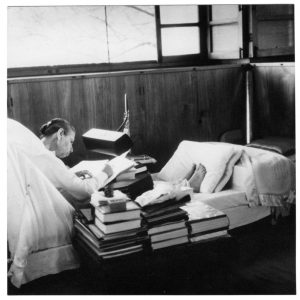| …if you want to do something well, whatever it may be, any kind of work, the least thing, play a game, write a book, do painting or music or run a race, anything at all, if you want to do it well, you must become what you are doing and not remain a small person looking at himself doing it; for if one looks at oneself acting, one is… one is still in complicity with the ego. If, in oneself, one succeeds in becoming what one does, it is a great progress. In the least little details, one must learn this. Take a very amusing instance: you want to fill a bottle from another bottle; you concentrate (you may try it as a discipline, as a gymnastic); well, as long as you are the bottle to be filled, the bottle from which one pours, and the movement of pouring, as long as you are only this, all goes well. But if unfortunately you think at a given moment: “Ah! It is getting on well, I am managing well”, the next moment it spills over! It is the same for everything, for everything. That is why work is a good means of discipline, for if you want to do the work properly, you must become the work instead of being someone who works, otherwise you will never do it well. If you remain “someone who works” and, besides, if your thoughts go vagabonding, then you may be sure that if you are handling fragile things they will break, if you are cooking, you will burn something, or if you are playing a game, you will miss all the balls! It is here, in this, that work is a great discipline. For if truly you want to do it well, this is the only way of doing it.
Take someone who is writing a book, for instance. If he looks at himself writing the book, you can’t imagine how dull the book will become; it smells immediately of the small human personality which is there and it loses all its value. When a painter paints a picture, if he observes himself painting the picture, the picture will never be good, it will always be a kind of projection of the painter’s personality; it will be without life, without force, without beauty. But if, all of a sudden, he becomes the thing he wants to express, if he becomes the brushes, the painting, the canvas, the subject, the image, the colours, the value, the whole thing, and is entirely inside it and lives it, he will make something magnificent.
For everything, everything, it is the same. There is nothing which cannot be a yogic discipline if one does it properly. And if it is not done properly, even tapasya will be of no use and will lead you nowhere. For it is the same thing, if you do your tapasya, all the time observing yourself doing it and telling yourself, “Am I making any progress, is this going to be better, am I going to succeed?”, then it is your ego, you know, which becomes more and more enormous and occupies the whole place, and there is no room for anything else. And we said the other day that the spiritual ego is the worst of all, for it is altogether unconscious of its inferiority, it is convinced it is something very superior, if not absolutely divine!
There we are. When you are at school, you must become the concentration which tries to catch what the teacher is saying, or the thought which enters you or the knowledge you are given. That is what you must be. You must not think of yourself but only of what you want to learn. And you will see that your capacities will immediately be doubled.
What gives most the feeling of inferiority, of limitation, smallness, impotence, is always this turning back upon oneself, this shutting oneself up in the bounds of a microscopic ego. One must widen oneself, open the doors. And the best way is to be able to concentrate upon what one is doing instead of concentrating upon oneself.
The Mother
Question and Answers 1950-1951, pages 362 – 364
|

